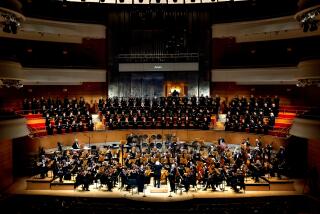Jackson Mac Low, 82; ‘Composer of Poetry’ Shaped His Verse Into Unconventional Forms, Sounds
- Share via
Jackson Mac Low, a prolific poet who questioned the nature of poetry and became a pioneer in liberating language from logic and lifting it into the realm of sound and performance, died Wednesday at Cabrini Hospital in New York City. He was 82, and had suffered a stroke last month.
A typical first response to encountering Mac Low in print or at the podium was one of mystification. Words and nonsense syllables unconnected by syntax might splay across the page every which way. He could write sentences that ran on for pages.
Modest, shy, seemingly uncertain, he performed his poems as if they were inexplicable music, the weird intoning and droning of utterances coming from somewhere deep and strange inside him.
Inspired by composer John Cage, with whom he studied in the 1950s, Mac Low used chance operations in making his art. Influenced also by Buddhist practice, he attempted to free his ego from his words, to take away his intentions from his art. Yet in defying the expected nature of poetry, Mac Low could be a peculiarly mesmerizing figure.
“He really went his own way,” Marjorie Perloff, an author of several books on progressive poetics, said Thursday. “But he was one of the few people who could combine music and word, and he was a true forerunner in the areas of conceptual art, sound poetry and performance art.”
From the very start, Mac Low challenged convention. Born in Chicago in 1922, he was educated at the University of Chicago and Brooklyn College. His first interest was in music, but by 1938, he was already writing poems with lines such as “Gay cake gotta gay cake go gotta gay cake,” and later he sometimes described himself as a “composer of poetry.”
Besides poetry and music, Mac Low was actively interested in theater and had a close association with the experimental Living Theatre in New York City during the 1950s and ‘60s. And in doing so, he didn’t so much break genres as ignore them altogether. Hence, he could provide music for a Living Theatre staging of W.H. Auden’s poem “The Age of Anxiety” or write his own play, “The Marrying Maiden,” meant as text for Cage’s music.
His interest in theater, performance, music and Cage -- as well as his involvement with anarchist thought -- also made him a key figure in Fluxus, the neo-Dada art movement of the early ‘60s. It was at that time that Mac Low came into his own as performer of his works.
Although he published 27 books, it is as a performer that Mac Low may best be remembered. However abstract the processes he tirelessly invented to produce his work, however artificial the poetry might look as printed text, it always came to life when he read.
A tireless advocate of sound poetry, Mac Low held teaching posts at Mannes School of Music (1966) and New York University (1966-73), and lectured widely, including at UC San Diego. Among his many honors was the $100,000 Wallace Stevens Award from the Academy of American Poets in 1999.
Mac Low is survived by his second wife, the poet Anne Tardos; and two children, Mordecai-Mark Mac Low and Clarinda Mac Low, from a previous marriage to painter Iris Lezak.
More to Read
The biggest entertainment stories
Get our big stories about Hollywood, film, television, music, arts, culture and more right in your inbox as soon as they publish.
You may occasionally receive promotional content from the Los Angeles Times.











